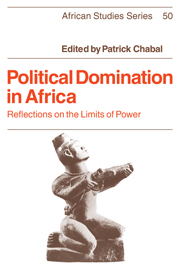Book contents
- Frontmatter
- Contents
- Acknowledgements
- Introduction: Thinking about politics in Africa
- 1 Democracy in Africa
- 2 Politics and vision in Africa: the interplay of domination, equality and liberty
- 3 Democracy and ethnocentrism
- 4 Wails and whispers: the people's voice in West African Muslim politics
- 5 Revolutionary democracy in Africa: the case of Guinea-Bissau
- 6 Civil society in Africa
- 7 Political accountability in African history
- 8 The politics of representation and good government in post-colonial Africa
- Notes
- Index
4 - Wails and whispers: the people's voice in West African Muslim politics
Published online by Cambridge University Press: 26 January 2010
- Frontmatter
- Contents
- Acknowledgements
- Introduction: Thinking about politics in Africa
- 1 Democracy in Africa
- 2 Politics and vision in Africa: the interplay of domination, equality and liberty
- 3 Democracy and ethnocentrism
- 4 Wails and whispers: the people's voice in West African Muslim politics
- 5 Revolutionary democracy in Africa: the case of Guinea-Bissau
- 6 Civil society in Africa
- 7 Political accountability in African history
- 8 The politics of representation and good government in post-colonial Africa
- Notes
- Index
Summary
The principle of the sovereignty of the people is at the base of all forms of government and it hides under the least free of institutions.
A. de Tocqueville, RecollectionsIf democracy is to be discovered beneath any form of government, as Tocqueville suggests, then a problem remains when reviewing African politics in ascertaining the solidity of government itself. Aristide Zolberg in an influential article of 1968 described the politics of the new states of Africa as taking place in ‘an almost institutionless arena … with conflict and disorder as its most prominent features’. The absence of political institutions, of ‘stable valued and recurring patterns of behaviour’, might then be seen as the fundamental problem: no institutions, no democracy? It is around the problem of institutions that the Muslim contribution to a democratic politics in Africa is reviewed here. Islam in Africa has certainly developed its own institutional forms, and it will be argued that each of these has its democratic dimension. Islam has also, perhaps paradoxically, helped to give substance to institutions of Western importation, in the institutions of the colonial and of the post-colonial state.
The will of the people may not of course be clearly or publicly expressed in the political setting of West African states. A defective democracy at best may prevail at the state level, with more or less gross electoral manipulation, and it will not be argued here that Muslim politics in West Africa, as it were, exceeds the regional democratic norm. We can talk of democracy in a West African Muslim setting only as a restricted, partial presence, an element in the structure of authority.
- Type
- Chapter
- Information
- Political Domination in Africa , pp. 71 - 83Publisher: Cambridge University PressPrint publication year: 1986
- 3
- Cited by

